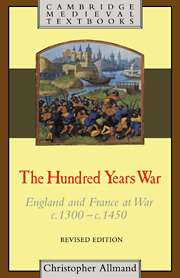Book contents
- Frontmatter
- Contents
- Preface
- List of abbreviations
- Maps
- Genealogy: the succession to the crown of France in the fourteenth and fifteenth centuries
- INTRODUCTION
- 1 THE CAUSES AND PROGRESS OF THE HUNDRED YEARS WAR
- 2 APPROACHES TO WAR
- 3 THE CONDUCT OF WAR
- 4 THE INSTITUTIONS OF WAR
- 5 WAR, SOCIAL MOVEMENT, AND CHANGE
- 6 WAR, PEOPLE, AND NATION
- 7 WAR AND LITERATURE
- CONCLUSION
- Select bibliography
- Index
- Cambridge Medieval Textbooks
7 - WAR AND LITERATURE
Published online by Cambridge University Press: 05 June 2012
- Frontmatter
- Contents
- Preface
- List of abbreviations
- Maps
- Genealogy: the succession to the crown of France in the fourteenth and fifteenth centuries
- INTRODUCTION
- 1 THE CAUSES AND PROGRESS OF THE HUNDRED YEARS WAR
- 2 APPROACHES TO WAR
- 3 THE CONDUCT OF WAR
- 4 THE INSTITUTIONS OF WAR
- 5 WAR, SOCIAL MOVEMENT, AND CHANGE
- 6 WAR, PEOPLE, AND NATION
- 7 WAR AND LITERATURE
- CONCLUSION
- Select bibliography
- Index
- Cambridge Medieval Textbooks
Summary
What can be learned by turning to contemporary writings which, in one way or another, touched on the theme of war? If we regard literature as a mirror, we see reflected in it something of the growing awareness of what war was, what it was doing to society, and how change was coming about. It was through literature that society thought aloud, commented on changing moral and political values, and reacted to developments of which it disapproved. No one writer could be the common voice on all matters which concerned the public; his importance might lie in him being a voice in the wilderness. But some notice of what people wrote, how, and when they did so, can give the historian an idea of reactions to events and developments.
There are at least two ways of recounting the same event: in war these reflect the points of view of the attacker and of the attacked. Chroniclers (like football correspondents today) tended to describe the events of war from the point of view of the attacker, but for whom there would have been no action to report. It was upon action that the greatest of the late medieval war correspondents, Jean Froissart, depended. Not over-concerned with seeking explanations for the causes of war, Froissart's prime interest was to report action in terms which would evoke the spirit of chivalry among his readers, making them wish that they themselves had taken part in the actions described.
- Type
- Chapter
- Information
- The Hundred Years WarEngland and France at War c.1300–c.1450, pp. 151 - 163Publisher: Cambridge University PressPrint publication year: 1988



